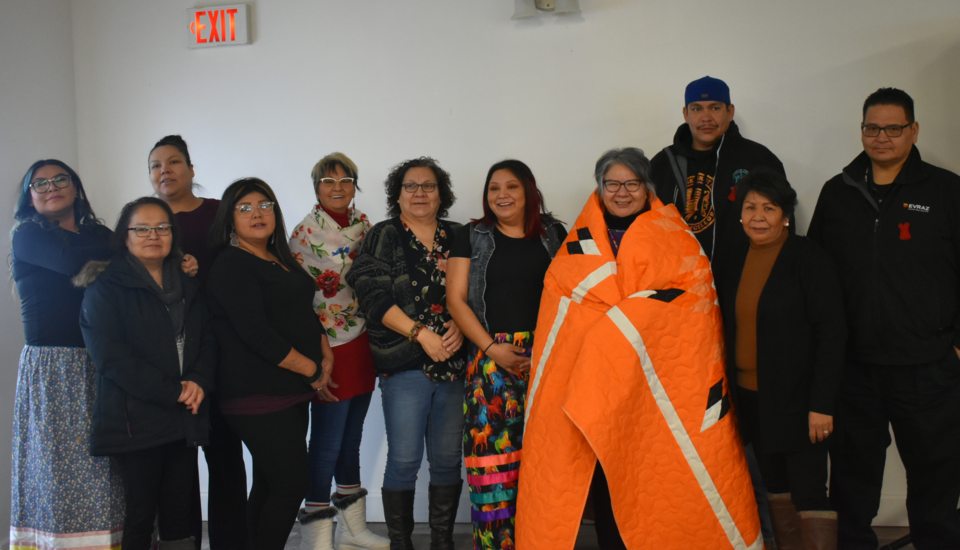KEESEEKOOSE FN - The National Chief of the Assembly of First Nations (AFN) RoseAnne Archibald visited Keeseekoose First Nation on the third of February for a meet-and-greet about the state of First Nations affairs. Discussion topics included: unmarked graves, intergenerational trauma, and a proposed national healing plan occurring.
Towards the beginning of the meeting, Archibald explained, “I really wanted to come here to Keeseekoose because, almost a year ago, you had the announcement of the little ones that were found through ground penetrating radar. At that time, I couldn't make it here. And I did connect with the chief at the time.
“I've been sending my prayers to this community. You've been in my heart, you've been in my mind.”
She went on to discuss how many of these unmarked burials have been recovered around former Residential Schools. She found difficulty calling them schools as she believes they were built for an ulterior purpose; Archibald regarded the buildings as “Former institutions of assimilation and genocide”. She went on to say, “Their purpose was to assimilate us and they were a tool for genocide against our children. They were there to destroy our families and to tear apart the social fabric of our communities.”
However, Archibald would mention that while First Nations people may still be traumatized from the after-effects of Residential Schools, there are survivors who have the strength to keep moving forward.
“We might have intergenerational trauma but we also have intergenerational strength. We also have intergenerational healing,” she said, adding that despite her challenges as the National Chief, she has always been able to move forward thinking about the sanctity of water reflecting that, “Water never stops moving. It goes around objects, it goes over obstacles, it goes under obstacles, never stops moving, it keeps moving forward. And that's all of us really, we are all always moving forward as people.”
Archibald stated she is advocating a national healing fund for First Nations communities. Each community would have a base fund to find and create a healing project that would benefit their people, saying that, “People have a way of healing that is specific to their language, their culture and their land.”
She has found success with Governor General Mary Simon, who has shown interest in the fund, who Archibald has said, “really wants to help with this idea in her world and so it's going to be something that we're going to continue to work on.”
Archibald believes this national healing plan will help solve the addiction crisis that faces First Nations communities. Healing the intergenerational trauma First Nations communities face, she believes will be part of the efforts to help end the opioid epidemic facing these communities.
“We have to get to that core and heal this core of our wounds. And until we do that, the symptoms will persist. This national healing fund, I believe will be a part of the answer to that.”
Toward the end of the meeting, the floor was opened for the community to voice concerns and ask questions of Archibald. Concerns regarding genocide, poverty, and First Nations sovereignty were raised. Former Chief of Keeseekoose Ted Quewezance also raised concerns that Archibald has been distracted by the media, saying that she needs to “Stick to what you committed when you made your national speech.”
Archibald then took the time to address the concerns raised by the people of Keeseekoose before she left to visit an unmarked grave in Keeseekoose.
She started her response by commenting on Ted Quewezance’s statement, “I want you to know that despite these difficulties Ted, I have not been distracted. The media wants people to believe that there's a distraction happening, but it's not distracting me. It's not distracting me. Every day we show up. And we do we're doing good work for the people. Every day. We don't let anybody slow us down.”
Going on to the topic of a universal income process for First Nations peoples, Archibald said, “I support that and the elimination of poverty, which also needs a strong economic plan”
She then informed the people of Keeseekoose that a prosperity table on the topic of lands and waters that they believed to be First Nation’s birthright was being established at the AFN.
“Land and waters that are your birthright. Somebody else has benefitted from, non-Indigenous peoples. And through this prosperity table, we want to make sure that First Nations are getting a piece of that wealth that's being generated from your lands and waters.”
Archibald reflected on the topic of First Nations genocide, saying that the AFN has connected with a reporter from the United Nations in hopes to have a report on genocide in Canada created. She then went on to commemorate Quewezance for his speaking, his strong voice and his strong representation of the First Nations communities in the prairies.
“I hope you keep going, that you keep speaking up and keep calling for this unified approach for survivors because you're right. Every day we lose survivors, every day we're losing elders and knowledge keepers. So I want to commend you for your work.”
The meeting was then closed shortly thereafter, and a lunch was held with traditional foods such as bannock, and various soups and stews being offered.
RoseAnne Archibald left the meeting with a handmade blanket presented to her by Cindy Straightnose on behalf of the Keeseekoose Chief; Lee Kitchemonia and council, the health council, the children of Keeseekoose, and community band members. She was also presented with a ribbon skirt from Stella Ketchemonia and Eunice Ketchemonia-Cote, Eunice Ketchemonia-Cote made the skirt. Archibald was honoured with the ribbon skirt as it’s “An Expression of love, character, and resilience.”, said Chief Lee Ketchemonia.




